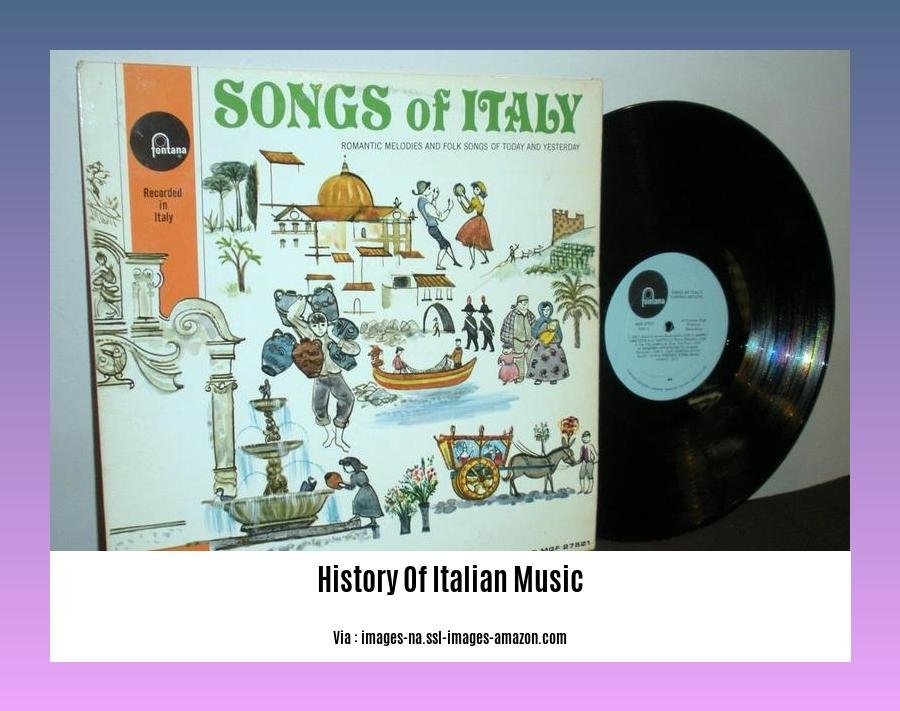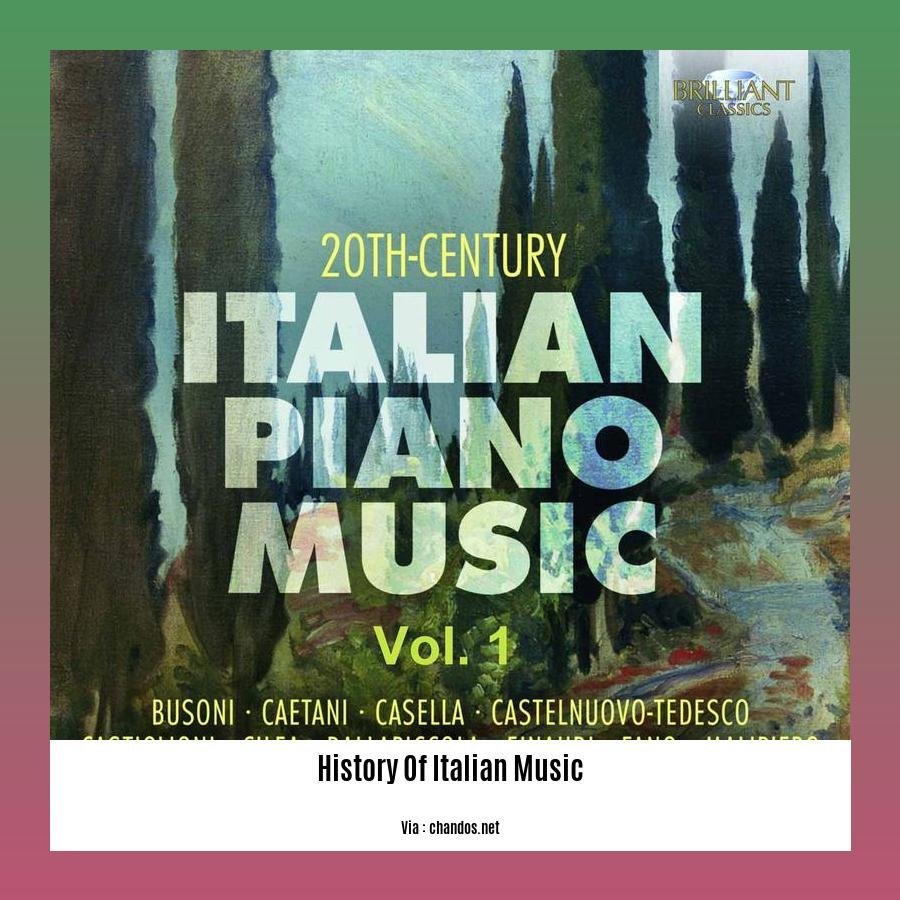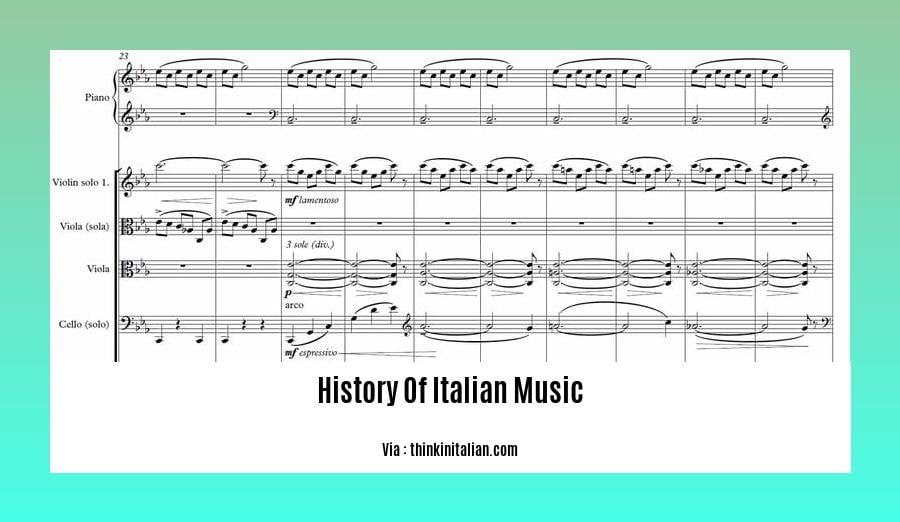Dive into the enchanting world of Italian music as we embark on a historical journey through the ages in our article titled “[A Journey Through Time: The History of Italian Music and Its Enduring Legacy].” From the ethereal melodies of Gregorian chant to the operatic masterpieces of Verdi and Puccini, and the vibrant rhythms of contemporary Italian pop, discover how this rich musical tapestry has captivated hearts and shaped cultural identities for centuries.
Key Takeaways:
- Italy boasts a rich musical history spanning from ancient Rome to the present day.
- Italy played a crucial role in the development of Western Christian liturgies, introducing antiphonal psalmody and responsorial singing of the Gradual.
- During the 16th century, Italy witnessed the rise of printed polyphonic music and advancements in instrumental music, leading to the international dissemination of Renaissance music.
- In the 19th century, Italy emerged as a prominent center of Romanticism in European music, with Italian opera transitioning from comic operas to more serious and dramatic works.
History of Italian Music

The history of Italian music is a rich and diverse one, encompassing various genres, composers, and cultural influences that have shaped its unique identity. Let’s explore this captivating musical journey:
Antiquity and the Middle Ages: The Roots of Italian Music
-
Music in ancient Rome played a significant role in religious ceremonies, theatrical performances, and military events.
-
The introduction of Christianity brought about the development of sacred music, including plainchant and polyphony.
-
Gregorian chant, a form of monophonic liturgical music, became standardized during this period.
The Renaissance: A Flourishing of Polyphony and Secular Music
-
The Renaissance witnessed a surge in polyphonic music, exemplified by the works of composers such as Palestrina and Lassus.
-
Secular music, including madrigals and frottole, gained popularity among the upper classes.
-
Instrumental music flourished with the rise of the lute, viol, and recorder.
The Baroque Era: The Birth of Opera and Instrumental Virtuosity
-
The early Baroque period saw the emergence of opera, a genre combining music, drama, and spectacle.
-
Composers like Monteverdi, Cavalli, and Handel contributed to opera’s development.
-
Instrumental music reached new heights with the rise of virtuosic performers like Corelli and Vivaldi.
The Classical Period: The Age of Elegance and Refinement
-
The Classical era brought a shift towards clarity, balance, and simplicity in music.
-
Composers such as Paisiello, Cimarosa, and Piccinni excelled in opera buffa, a form of comic opera.
-
Instrumental music, exemplified by the works of Boccherini and Sammartini, emphasized elegance and refinement.
The Romantic Era: Passion, Nationalism, and Opera’s Golden Age
-
The 19th century marked the rise of Romanticism in music, characterized by emotional intensity and nationalistic sentiments.
-
Italian opera composers like Verdi, Puccini, and Donizetti created some of the most beloved operas in history.
-
Instrumental music also flourished with the works of Paganini, Rossini, and Bellini.
The 20th Century and Beyond: Modernism, Experimentation, and New Directions
-
The 20th century saw a diverse range of musical styles, from modernism to experimental music.
-
Composers like Dallapiccola, Nono, and Berio pushed the boundaries of musical expression.
-
Italian popular music, influenced by international trends, gained global popularity.
In summary, the history of Italian music is a testament to the country’s rich cultural heritage and its enduring influence on the world of music. From ancient chants to modern masterpieces, Italian music continues to captivate audiences around the globe.
-
To uncover the engrossing narrative behind the majestic Itachuna Rajbari, delve into our insightful article on the history of Itachuna Rajbari.
-
Unravel the captivating journey of Jaguar cars through the decades in our comprehensive exploration of the history of Jaguar cars.
-
Embark on a resplendent voyage through the annals of adornment in our meticulously crafted article on the history of jewellery.
Significant Composers and Their Works: Monteverdi, Vivaldi, Rossini, Verdi, and Puccini

The rich tapestry of Italian music is adorned with a constellation of renowned composers whose works have left an enduring mark on the global musical landscape. Let’s embark on a journey to discover the lives and legacies of five of Italy’s most celebrated maestros: Monteverdi, Vivaldi, Rossini, Verdi, and Puccini.
Claudio Monteverdi: The Pathbreaker
- Monteverdi’s groundbreaking compositions revolutionized the transition from the Renaissance to the Baroque era, blurring the lines between sacred and secular music.
- His operas, such as “L’Orfeo” and “L’incoronazione di Poppea,” showcased his mastery of dramatic expression and laid the foundation for the genre’s development.
Antonio Vivaldi: The Red-Haired Priest
- Vivaldi, the red-haired virtuoso, was not only a prolific composer but also a skilled violinist and teacher.
- His concertos, particularly “The Four Seasons,” are a testament to his innovative approach to instrumental music, painting vivid soundscapes that bring the changing seasons to life.
Giuseppe Verdi: The Master of Opera
- Verdi, Italy’s most celebrated opera composer, rose from humble beginnings to become a national icon.
- His operas, including “La Traviata,” “Aida,” and “Otello,” are renowned for their dramatic intensity, soaring melodies, and exploration of human emotions.
Giacomo Puccini: The Melodist
- Puccini, a master of melody and orchestration, captured the hearts of audiences worldwide with his operas.
- Works like “La Bohème,” “Tosca,” and “Madama Butterfly” showcase his ability to create unforgettable tunes that linger in the memory long after the final curtain falls.
Key Takeaways:
-
Monteverdi: Pioneered the transition from Renaissance to Baroque music, revolutionized opera with dramatic expression.
-
Vivaldi: Master of concertos, notably “The Four Seasons,” painted musical landscapes with his violin.
-
Verdi: Italy’s opera icon, captivated audiences with emotional intensity and soaring melodies.
-
Puccini: Melodist extraordinaire, created unforgettable tunes that touched hearts全球各地.
[Sources:]
-
The History of Italian Music
Opera: The Defining Genre of Italian Music and Its Global Impact
Imagine a world where every emotion, story, and historical event is painted with the vibrant colors of melody and harmony. In the realm of music, few countries have left such an indelible mark as Italy, the birthplace of opera, one of the most expressive and captivating art forms known to mankind.
Opera: A Musical Masterpiece
Opera emerged in the late 16th century as a fusion of poetry, music, and theater, using the power of the human voice to elevate narratives to new heights. It wasn’t long before this enchanting genre captivated audiences across the globe.
Three Centuries of Musical Magic
From the early operas of Claudio Monteverdi to the operatic masterpieces of Giuseppe Verdi, Italian composers have shaped the history of opera like no other. The melodies of Ennio Morricone‘s film scores, the emotional depth of Giacomo Puccini‘s operas, and the virtuosity of Gioachino Rossini‘s compositions all played a pivotal role in defining the genre.
An Enduring Legacy
To this day, the legacy of Italian opera reverberates far beyond its country of origin. Opera houses across the world host countless performances annually, honoring the traditions of the past while embracing modern interpretations. The impact of Italian opera continues to inspire and enchant millions, solidifying its place as a cornerstone of global culture.
Key Takeaways:
-
Opera, a fusion of poetry, music, and theater, originated in Italy in the late 16th century.
-
Italian composers like Monteverdi, Verdi, Morricone, Puccini, and Rossini left an indelible mark on the history and development of opera.
-
Opera’s global reach is evident in the numerous opera houses around the world and its enduring popularity with audiences of all cultures.
References:
[1]
[2]
Influence of Italian Music on Western Classical Music and Beyond
Key Takeaways:
- Italian music’s profound impact on Western classical music is undeniable.
- The Gregorian chant, an iconic Italian contribution to sacred music, shaped Western music’s foundation.
- Italian composers traveled across Europe, sharing their musical ideas and influencing the development of various national styles.
- The opera, a genre born in Italy, revolutionized musical storytelling and captivated audiences worldwide.
Italy, the birthplace of Western music, has played a pivotal role in shaping the classical music landscape. Its influence extends not only to the development of Western classical music itself but also to a multitude of other genres beyond the classical realm.
The Roots of Western Music:
The history of Italian music intertwines with the very roots of Western music. The Gregorian chant, a form of sacred music developed in the 6th-7th centuries, originated in Italy and became the foundation upon which much of Western music would be built. The chant’s influence can still be heard in many classical compositions, particularly those of the Renaissance and Baroque periods.
The Birth of Opera:
In the 17th century, Italy gave birth to a genre that would captivate audiences worldwide – the opera. This dramatic form of musical storytelling combined music, drama, and spectacle to create a powerful and immersive experience. The opera quickly spread throughout Europe, with countries like France and Germany developing their own operatic traditions.
Italian Composers and Their Influence:
The influence of Italian music extended far beyond its borders thanks to the many talented composers who traveled throughout Europe. These composers introduced Italian musical ideas and techniques to other countries, contributing to the development of national styles and enriching the musical landscape of Europe. For instance, the Italian composer Giovanni Paisiello left a significant impact on Russian music while serving as the court composer in St. Petersburg.
The Enduring Legacy:
The influence of Italian music on Western classical music has endured for centuries, continuing to shape and inspire composers and musicians worldwide. Its legacy extends beyond classical music, influencing genres like jazz, pop, and rock. Italian composers such as Ennio Morricone have gained international recognition for their film scores, bringing Italian music to a global audience.
Italian music has left an indelible mark on the world of music. From the Gregorian chant to the opera, from the great composers of the past to the contemporary musicians of today, the influence of Italian music is undeniable.
Sources:
[1] https://www.britannica.com/art/Western-music
[2]
FAQ
Q1: What are some of the key periods in the history of Italian music?
A1: Italian music has a rich history that spans several key periods, including the Renaissance (14th-16th centuries), the Baroque era (17th-18th centuries), the Classical period (late 18th century), and the Romantic period (19th century). Each of these periods is marked by its own unique musical styles, forms, and composers.
Q2: Who are some of the most famous Italian composers?
A2: Italy has produced a remarkable number of renowned composers throughout history. Some of the most famous include Claudio Monteverdi, Antonio Vivaldi, Giuseppe Verdi, Giacomo Puccini, and Ennio Morricone. These composers have left an indelible mark on the world of music with their operas, concertos, and other works.
Q3: What role did Italy play in the development of opera?
A3: Italy played a crucial role in the development of opera, which originated in the late 16th century. Florence, under the patronage of the Medici family, became the birthplace of opera with the creation of “intermezzi” and the first operas. Italian composers such as Claudio Monteverdi and Giacomo Puccini were instrumental in shaping the genre, which later spread to other parts of Europe.
Q4: How has Italian music influenced other countries?
A4: Italian music has had a profound influence on the music of other countries. Italian composers and musicians traveled throughout Europe, sharing their musical knowledge and skills. The Italian style of opera, in particular, became popular in many countries, leading to the development of national opera traditions. Additionally, Italian instrumental music, such as the concerto, was widely adopted and adapted by composers in other countries.
Q5: What are some of the unique characteristics of Italian music?
A5: Italian music is known for its melodic beauty, expressive qualities, and technical virtuosity. Italian composers have a long tradition of writing for the human voice, and Italian opera is renowned for its dramatic and emotional power. Additionally, Italian instrumental music, particularly during the Baroque era, is characterized by its use of intricate counterpoint, ornamentation, and dynamic contrasts.
- Unraveling Einstein’s Legacy: Who Inherited His Genius? - July 14, 2025
- Unlock Einstein’s Family Tree: Bernhard Caesar & Untold Stories - July 14, 2025
- Unveiling Bernhard Caesar Einstein: His Life & Albert Einstein’s Legacy - July 14, 2025




![[Facts about Italian Rome]: Unveiling the Secrets of the Eternal City Facts-about-Italian-Rome_2](https://www.lolaapp.com/wp-content/uploads/2023/12/Facts-about-Italian-Rome_2-150x150.jpg)











